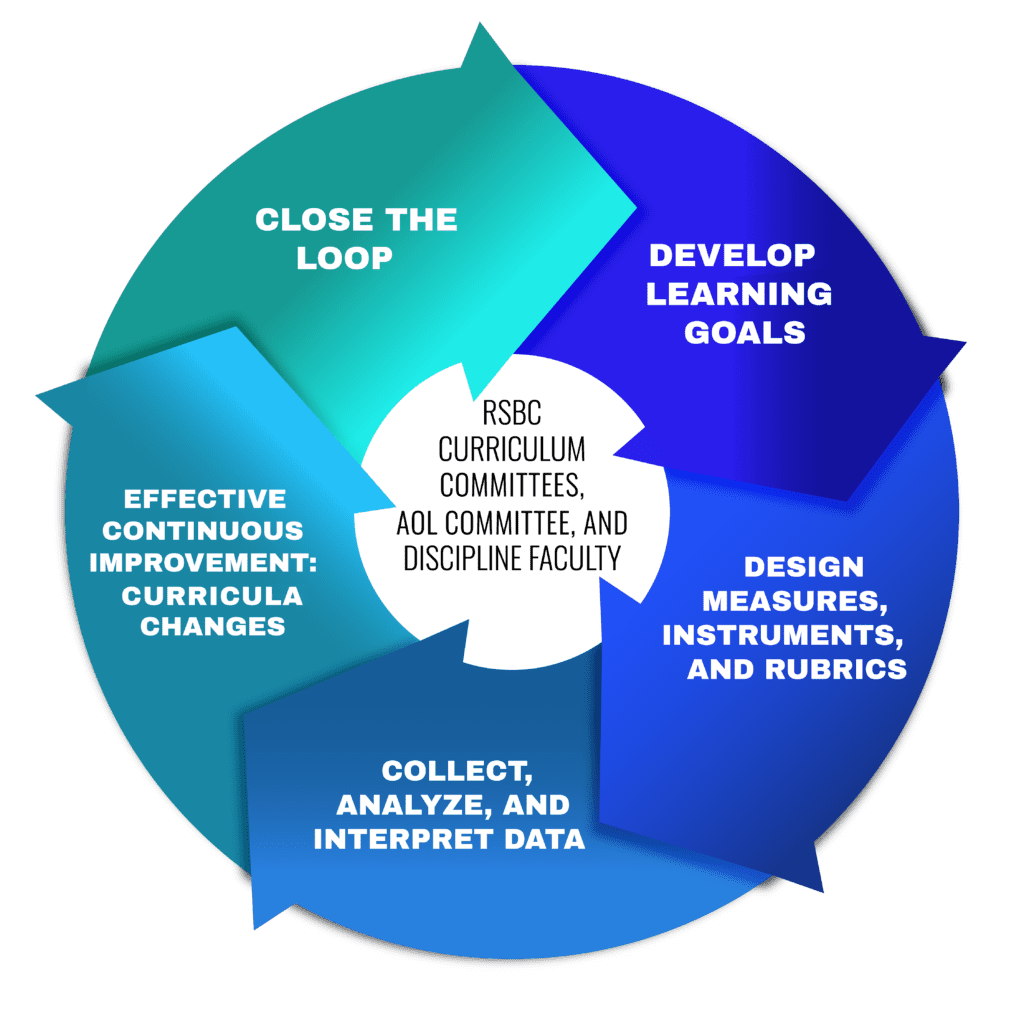Rutgers School of Business–Camden
Assurance of Learning (AoL)
no
no
AoL Planning Cycle

Assurance of Learning (AoL) refers to the systematic process used to demonstrate that students achieve learning competencies for the programs in which they participate. AoL also includes the processes of identifying competency gaps, then designing and implementing changes to the curriculum and learning experience so that gaps are closed or offset by compensating efforts towards learner success.
Rutgers School of Business–Camden’s mission and strategic plan includes concerted efforts to deliver a rigorous business curriculum that provides transformative education and leadership development for students. In support of this goal, the school is committed to the assurance of student learning through a comprehensive, meaningful, and ongoing assessment effort that has broad faculty and staff input and support.
The AoL effort includes many individuals and teams including that of the Assurance of Learning and Continuous Improvement Committee.
AOL & Continuous Improvement Committee
- Dr. Monica Adya, Dean (Interim Chair of the Committee)
-
Dr. Joseph Canada, Assistant Professor of Professional Practice, Accounting
-
Dr. Jun Guo, Associate Professor, Accounting
-
Dr. Kristie McAlpine, Assistant Professor, Management
-
Dr. Andrei Nikiforov, Assistant Professor of Professional Practice, Finance
-
Dr. Robert Schindler, Professor, Marketing
-
Dr. Deeksha Singh, Associate Professor, Management
-
Dr. Shankar Sundaresan, Associate Professor of Professional Practice, Management
- Nathan Levinson, Director of Academic Administration (Staff)
- Dr. Sney Banerjee, Associate Dean of Graduate Programs (Ex Officio)
- Dr. Oscar Holmes IV, Associate Dean of Undergraduate Programs (Ex Officio)
Learning Goals/Objectives by Degree Program
Undergraduate Programs
Goal #1: General Management Knowledge
Students will demonstrate an understanding of the basic functions of business and functional area concepts.
Goal #2: Critical Thinking and Analytical Decision Making
Students will be able to critically use information and data to analyze, interpret, and solve business problems.
Goal #3: Teamwork and Interpersonal Relations
Students will develop interpersonal skills arid demonstrate the ability to work effectively in teams.
Goal #4: Communication Impact and Effectiveness
Students will demonstrate effective oral presentation and written language skills.
Goal #5: Global Perspective
Students will demonstrate an ability to identify and analyze global factors (political economic, culture, legal, demographic) that impact the management of business operations in the global environment.
Goal #6: Ethical Reasoning
Students will realize that organizations and their actions affect different stakeholders; they will demonstrate the ability to identify and weigh the ethical implications of these actions.
Goal #7: Technology Fluency and IT Literacy
Students will demonstrate conceptual knowledge and practical application of information technology.
Goal #1: General Management Knowledge
Students will demonstrate an understanding of the basic functions of business and functional area concepts.
Goal #2: Critical Thinking and Analytical Decision Making
Students will be able to critically use information and data to analyze, interpret and solve business problems.
Goal #3: Teamwork and Interpersonal Relations
Students will develop interpersonal skills arid demonstrate the ability to work effectively in teams.
Goal #4: Communication Impact and Effectiveness
Students will demonstrate effective oral presentation and written language skills.
Goal #5: Global Perspective
Students will demonstrate an ability to identify and analyze global factors (political economic, culture, legal, demographic) that impact the management of business operations in the global environment.
Goal #6: Ethical Reasoning
Students will realize that organizations and their actions affect different stakeholders; they will demonstrate the ability to identify and weigh the ethical implications of these actions.
Goal #7: Technology Fluency and IT Literacy
Students will demonstrate conceptual knowledge and practical application of information technology.
Graduate Programs
Goal #1: Professional and Ethical Competency
Students will demonstrate professional competency in Financial Reporting and Research Managerial Accounting, Taxation, Accounting Information Systems, and Auditing, as well as demonstrate the capability to recognize ethical issues demonstrating the ability to understand accountants’ professional obligations and apply ethical principles and accounting regulations to anticipate and respond to stakeholder expectations.
Goal #2: Analytical Problem Solving and Critical Thinking Skills
Students will apply critical thinking skills; identify, model, and solve decision problems in different settings; and interpret results/solutions by identifying appropriate course(s) of action(s).
Goal #3: Communication Impact and Effectiveness
Students will demonstrate the ability to communicate both orally and in writing with various stakeholders and partners.
Goal #4: Technology Fluency and IT Literacy
Students will demonstrate conceptual knowledge and practical application of information technology.
Goal #1: Critical Thinking and Analytical Decision Making
Students will be able to critically interpret and synthesize information and data to solve business problems.
Goal #2: Teamwork and Interpersonal Relations
Students will develop interpersonal skills and demonstrate the ability to work effectively in teams.
Goal #3: Leadership
Students will understand what leadership is and how to define it, as well as develop basic approaches to managing and motivating others to achieve joint goals.
Goal #4: Communication – Impact and Effectiveness
Students will demonstrate effective oral presentation and written language skills.
Goal #5: Global Perspective
Students will demonstrate an ability to understand and evaluate diverse business environments in which firms operate globally.
Goal #6: Ethical Reasoning
Students will realize that organizations and their actions affect different stakeholders; they will demonstrate the ability to identify and weigh the ethical implications of these actions.
Goal #7: Technology Fluency and IT Literacy
Students will demonstrate conceptual knowledge and practical application of information technology.
Goal #1: Discipline Specific Knowledge
Students will acquire discipline-specific knowledge and understanding, by critically applying the concepts, methods, and approaches of business analytics.
Goal #2: Analytical Problem Solving and Critical Thinking Skills
Students will apply critical thinking skills; identify, model, and solve decision problems in different settings; and interpret results and solutions identifying appropriate course(s) of action(s).
Goal #3: Communication Impact and Effectiveness
Students will acquire effective communication skills through effectively conveying the results of technical analysis using non-technical, managerial terms.
Goal #1: Discipline Specific Knowledge
Students will demonstrate knowledge of financial markets, financial products, and financial decision making.
Goal #2: Critical Thinking Skills
Students will interpret, evaluate, and synthesize information to recommend solutions to complex financial problems.
Goal #3: Ethical Reasoning
Students will demonstrate knowledge of the effects of financial decisions on individuals, groups, and society at large.





